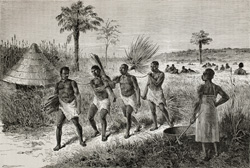Forced labour issues brought into the open
Forced labour, the work people do against their will under threat (of destitution, death or violence, for instance) can take many forms. While the practice of forced labour has been condemned, repressive labour organisation is a subject meriting further academic attention. The EU-funded Forced labour project has studied the history of this labour practice in south-west, west and south-central Africa (Angola, Gabon, and Zambia) between 1930 and 1970. The researchers have outlined and compared experiences involving decolonisation and the post-colonial redefinition of labour relations. The huge amount of archival work has resulted in seven articles and four conferences, two in sub-Saharan Africa and the other two in Europe. The project has identified the main trends in the organisation of forced labour. Firstly, the ubiquitous nature of this labour practice by European administrators became apparent. Whole towns were destabilised as a result of migration to avoid being exploited. The impact of repressed labour is continuing well into the post-colonial period. These trends will be detailed in a handbook on the history of forced labour in southern Africa. the study will be invaluable inasmuch it will encourage African governments to take a much stricter stance against modern-day phenomena such as child trafficking and domestic slavery. It is hoped that by openly discussing the European history of enforced labour, the way will open to dealing with present-day forms of this repressive practice.



